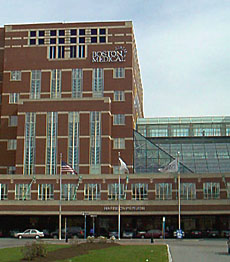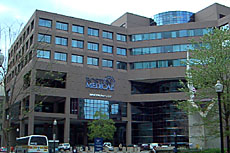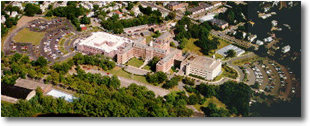Affiliated Hospitals
The Boston Medical Center was formed on July 1, 1996 by the merger of Boston City Hospital with Boston University Medical Center Hospital.
On all inpatient consultation services, the attending physician in Infectious Diseases makes daily rounds with fellows, students and residents. Rounds include presentation of new cases, review of ongoing cases, X-rays, Gram stains and other microbiologic data.
Boston Medical Center: Menino Pavilion

The Menino Pavilion of the Boston Medical Center, a 350-bed hospital adjacent to the Boston University School of Medicine, has a long and illustrious tradition of training in Medicine and Infectious Diseases. All medical, surgical, pediatric, obstetric, and gynecologic specialties have active clinical services and house staff training programs. A very busy emergency room treats a large number of patients with traumatic injuries and acute medical and surgical problems. Approximately 50-60 new consultations in infectious diseases are seen monthly. On the inpatient consultation service, the attending physician in Infectious Diseases makes daily rounds with fellows, students, and residents. This includes the presentation of new cases and discussion of ongoing cases, with review of X-rays, gram stains and other microbiologic data.
The BMC Center for Infectious Diseases provides primary care to HIV-infected individuals and is a major participant in the AIDS Clinical Trials Group (ACTG) and other clinical research activities. Patients with a wide variety of other Infectious diseases problems are also seen in consultation. The Sexually Transmitted Diseases Clinic is one of the busiest public health clinics in the state, with 3,000 visits per year. The International Health Clinic (combined adult & pediatric) provides consultations in tropical/geographic medicine, offers pre-travel education/immunization, and serves as the largest refugee screening center in the Commonwealth of Massachusetts.
The Tuberculosis Clinic follows approximately 80% of all active cases seen in this state. The Hepatitis C Clinic serves as a center for evaluation, treatment, and research.
Boston Medical Center: East Newton Pavilion (formerly University Hospital)

The East Newton site is a 300-bed tertiary referral hospital located on the campus of the Boston University School of Medicine. There are active clinical services and house staff training programs in all of the major medical specialties, including surgery and rehabilitation medicine.
Of particular interest to the Infectious Diseases Service are the active programs in hematology-oncology (including stem cell transplantation), renal transplantation, dialysis, cardiothoracic surgery, rheumatology, peripheral vascular disease, spinal cord injury, and gerontology. The Infectious Diseases Service currently provides approximately 50-60 new consultations each month.
Daily attending rounds with the fellow, clinical pharmacist, students, and residents are an opportunity for the presentation of new and existing cases, with review of X-rays, gram stains, and other microbiologic data.
VA Boston Healthcare System

The VA Boston Healthcare system includes the Jamaica Plain Division, pictured above, and the West Roxbury Division, below.

The VA Boston Healthcare system includes a 250-bed general medical and surgical hospital. The Medical Service has strong representation from each of the medical subspecialties and serves as a teaching affiliate for Boston University and Harvard Medical School residency training programs . The VA treats a broad spectrum of diseases, with an emphasis on those conditions most prevalent in the population of veterans, i.e., cardiovascular and cerebrovascular diseases, cancer (particularly lung, head, and neck), cirrhosis and its complications, spinal cord injuries, and chronic obstructive pulmonary disease. The hospital is a major tertiary referral center for other northeastern VA facilities, particularly with regard to complicated medical illnesses, surgery, hemodialysis, renal transplantation, radiation therapy, and diagnostic and interventional radiology. The fellow performs about 40 infectious disease consultations per month, and is often assisted in these consultations by medical students or a medical resident. A clinical pharmacist also participates in daily rounds. While on clinical service at the VA, the fellow may also see patients in the VA HIV clinic.